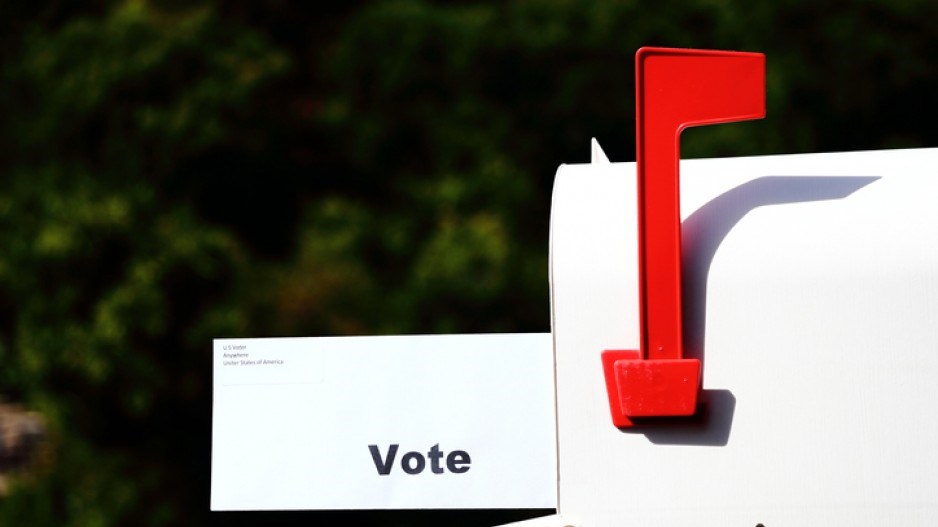The COVID-19 pandemic has forced British Columbians into an unusual provincial electoral campaign.
As Research Co. and Glacier Media continue to track this democratic process, we see a growing appetite to vote by mail, as well as a desire to explore the possibility of online voting in the future.
In the early days of the campaign, 29 per cent of likely voters in British Columbia expressed a preference for casting their ballot by mail in 2020. This month, the proportion has increased to 43 per cent. This leaves roughly half of likely voters contemplating a vote on election day (25 per cent) and on the advanced polls (23 per cent).
Of course, not all postal voters are behaving in the same fashion. While 19 per cent have already mailed their ballot back, 18 per cent currently possess their ballot but have not sent it to Elections BC. More than a third (35 per cent) are waiting for their ballot to arrive and 28 per cent are still planning to request it from Elections BC.
Regardless of whether votes are cast by mail or in person, likely voters in British Columbia have a clear idea of the specific features of the campaign that are influential in deciding who to vote for. Practically seven in 10 (69 per cent) name party platforms, while 52 per cent mention discussions with family and 46 per cent cite discussions with friends.
While only three in 10 likely voters (30 per cent) say interacting with candidates on social media and endorsements from non-governmental organizations will influence their vote, the proportion rises to 46 per cent on each feature among those aged 18 to 34.
A similar proportion of likely voters (29 per cent) will be influenced by campaign ads on radio and television, including 34 per cent of those aged 18 to 34 and aged 35 to 54. Fewer than three in 10 likely voters are swayed after interacting with other people on social media (27 per cent), or endorsements from unions (26 per cent), trade associations (25 per cent) and newspapers (23 per cent).
British Columbia’s election is happening at the same time as democratic processes in the United States and Saskatchewan. We have already seen one presidential debate where the candidates from minor parties in the United States were not given a podium on the same stage as Republican incumbent Donald Trump and Democratic challenger Joe Biden.
In Saskatchewan, this week’s televised debate is a two-person contest, with incumbent Premier Scott Moe of the Saskatchewan Party and opposition leader Ryan Meili from the Saskatchewan New Democratic Party (NDP), even if four other parties are running candidates in the election.
The debate in British Columbia will include only the leaders of the three parties that held seats in the legislative assembly at dissolution: the BC Liberals, the BC New Democratic Party (NDP) and the Green Party of BC.
Fewer than half of likely voters in British Columbia believe the televised debate is a good opportunity for voters to get to know the leaders of the parties that fell well short of running a full slate of candidates in this election. More than a third would like to listen to representatives from the BC Conservative Party (41 per cent) and the BC Libertarian Party (35 per cent) on debate night, even if neither party is close to double-digits on voting intention. Significantly fewer likely voters want to hear from the Rural BC Party (22 per cent), BC Vision (19 per cent), the Christian Heritage Party (also 19 per cent), the Communist Party (16 per cent) and Wexit BC (also 16 per cent).
One noteworthy aspect is that trust in the non-partisan office charged with organizing the vote has grown. More than nine in 10 likely voters (93 per cent, up three points since September) express confidence in Elections BC to oversee the entire voting process. Similarly high proportions of voters expect Elections BC to ensure that there is no fraudulent activity with mailed ballots (87 per cent, up five points) and enforce social distancing at polling stations (86 per cent, up 12 points).
In a year when residents have had to do pretty much everything online because of the COVID-19 pandemic, more than three in five likely voters (63 per cent) think Elections BC should consider allowing British Columbians to cast their votes online in the next provincial election.
Estonia, a Baltic nation of 1.3 million people that is a member of the European Union (EU), has had an online voting option for years. In the 2019 parliamentary election, 44 per cent of the votes were cast online. Almost two-thirds of eligible Estonian voters (64 per cent) participated in the democratic process, which featured no allegations of electronic fraud.
The non-political state of British Columbia’s electorate at the midway point of the campaign is unlike any other this century. Likely voters are leaning heavily towards the option of casting a ballot through the mail. Platforms, family and friends are the main influencers of our voting behaviour. Debates are not for parties that lack a mathematical chance of forming the next government. And, while we hope for a return to normalcy that would make casting a ballot the old-fashioned way more appealing, the idea of voting online is attractive to a majority of those who participate in elections.
- Mario Canseco is president of Research Co.


